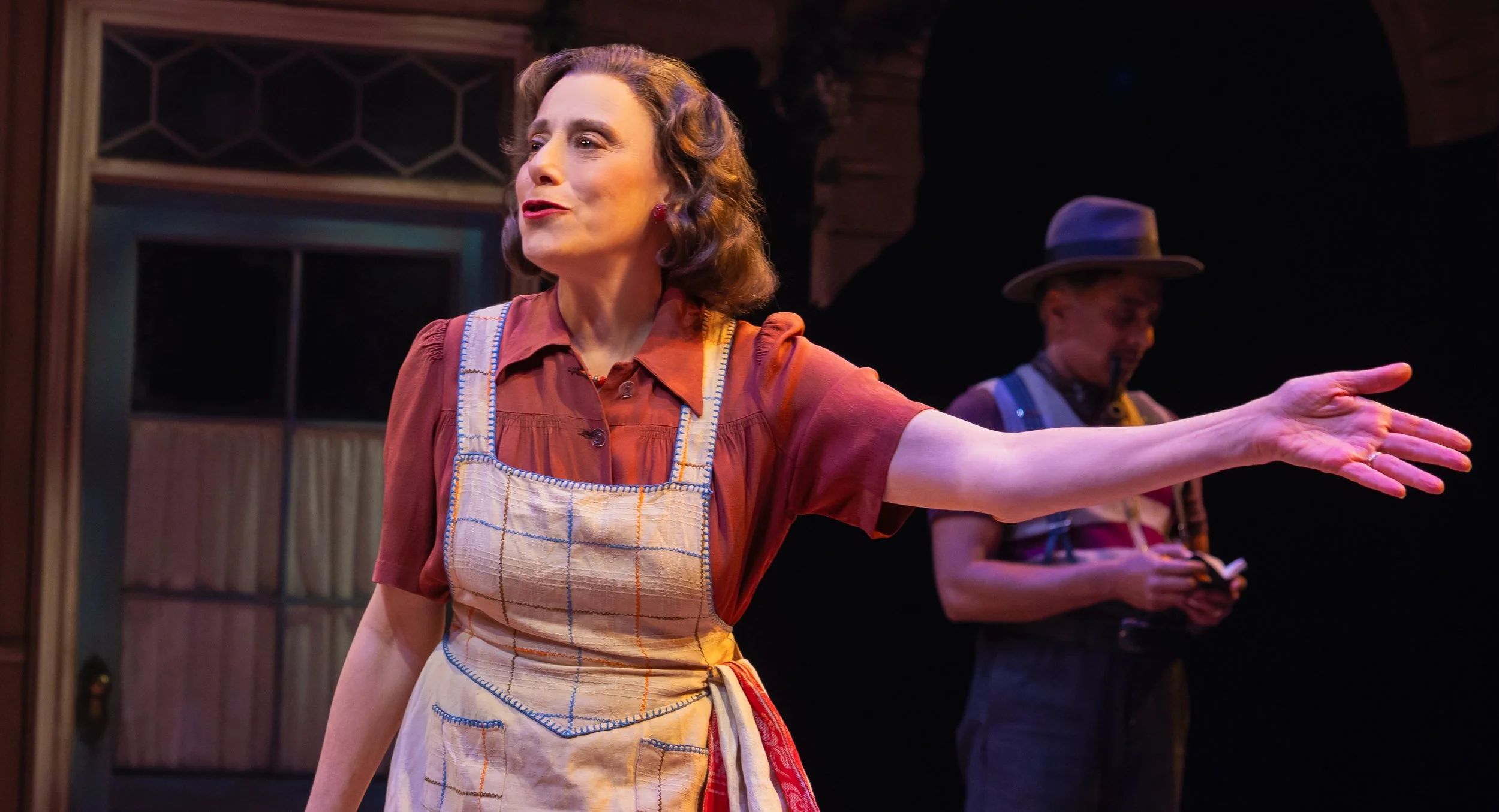Scott Bakula (right) is the baker, and Ariana DeBose (to his right) is his wife, Geneviève, celebrating the long-awaited new bakery in a town that has yearned for someone to fill their bread orders, in The Baker’s Wife at Classic Stage Company.
The musical The Baker’s Wife has had a notoriously checkered history. With a book by Joseph Stein and music and lyrics by a young Stephen Schwartz, it first appeared in 1976. But, amid casting changes (Patti LuPone survived) and infighting, producer David Merrick closed it before it got to Broadway. Over the years it has had many iterations, in hopes of correcting whatever sank it then (critics excoriated the book but praised the music). LuPone’s song “Meadowlark” has become a standard for cabaret singers. The current revival at the Classic Stage Company (CSC), boasting a stellar cast, is likely to be its best shot at resuscitation.
Geneviève and Aimable share a loving moment in the Stephen Schwartz musical. Photographs by Matthew Murphy and Evan Zimmerman.
Based on Marcel Pagnol’s 1938 French film, starring the pudgy, jowly Raimu, the musical is largely faithful to the story: a town baker has died, and the villagers have been traveling to a neighboring village for bread that arrives stale and hard. But a new baker, Aimable, has arrived with a much younger wife, Geneviève, in tow.
One key update is that the middle-aged baker is no longer a forlorn schlub. He has been transformed into silver fox Scott Bakula, making it a harder sell that Geneviève (Ariana DeBose) would run off; but, as the village’s misogynistic restaurant owner Claude (Robert Cuccioli) says, “Who can understand women?”
Another improvement on the film, in which Geneviève, unhappy from the get-go, comes on to a local playboy, Dominique, is that she seems genuinely in love with her husband at the start:
Judy Kuhn as Denise narrates the show and introduces the villagers.
No one else I’d ever known
Has ever really seemed to care
Just when I was most alone
And feeling hopeless you were there
To make each empty day
So bright for me.
However, when Dominique (Kevin William Paul), a servant of the local Marquis (Nathan Lee Graham), falls hard for this “purer” Geneviève, his aggressiveness carries a strong whiff of the serpent in Eden. No sooner has he been introduced than he asks her to go for a ride:
Dominique: What harm is there in a nice little drive? Oh—unless you think your husband would be jealous.
Geneviève: Jealous? Why should he be jealous?
The answer might be because director Gordon Greenberg has DeBose stroke a baguette on the line. And so, in spite of her words of affection for Aimable, she later tells him: “You don’t know people. … You don’t even know me.” It’s an abrupt turnaround.
Aimable is also pretty much a dupe. When Dominique arrives to serenade Geneviève under her balcony while he is home, Aimable thinks it’s a thank you for his baking and says, “Next time sing something for my wife.” His cluelessness, Dominique’s aggressive wooing—can they be glossed over as merely quaint and French in a post-Epstein, post-Weinstein world?
DeBose and Dominique (Kevin William Paul) do a romantic dance (by Stephanie Klemons) in the show.
Fortunately, there are many subsidiary characters in the village (as in the film), and Greenberg has cast the production lavishly. Arnie Burton plays a dryly didactic teacher, Kevin Del Aguila is the nosy town drunk Antoine (who makes the most of some of the best lines), and Alma Cuervo is the judgmental spinster Thérèse (“Men! Pigs! Thank God I never married”), all in top form. Less successful is Graham’s prissy Marquis, who travels with a trio of “nieces” who fool nobody.
Most important among the villagers is Claude’s wife, Denise (Judy Kuhn), who serves as both narrator and a more sympathetic heroine—she endures Claude’s emotional abuse and gives as good as she gets, though his every insult pains her:
Claude: I once had a young and pretty wife.
Teacher: You did? You had no wife before Denise.
Claude: That’s the one I mean.
Denise: Well, speaking for myself, I like marriage … not necessarily mine!
From left: Hailey Thomas plays Nicole, Samantha Gershman is Inez, and Savannah Lee Birdsong is Simone—all putative “nieces” of a debauched Marquis (Nathan Lee Graham, right).
The score, however, remains richly melodic. “Meadowlark,” thrillingly sung by DeBose, is just one of many vocal highlights. As a lyricist, Schwartz learned from the masters: what is the paean “Bread” if not a version of “The Wells Fargo Wagon” from The Music Man, or “Coffee Break” from How to Succeed in Business Without Really Trying?
Bradley King’s green-and-lavender lighting conjures a provincial and Provençal atmosphere, and Jason Sherwood’s greenery-enshrouded set is equally impressive. Sherwood’s only misstep is a display case with pastries alongside baguettes. Aimable is a baker (boulanger), not a pâtissier; he would never have time to bake and frost pastries.
If one can overlook some skeevy, outmoded sexual politics, including an obsession with cuckoldry, CSC’s production of The Baker’s Wife offers abundant pleasures.
The Baker’s Wife plays through Dec. 21 at Classic Stage Company (136 E. 13th St.). Evening performances are at 7 p.m. Tuesday through Saturday; matinees are at 2 p.m. Wednesday, Saturday, and Sunday; no performances on Nov. 26 or 27, but there is a Wednesday matinee at 2 p.m. on Nov. 26. For tickets and more information, visit classicstage.org.
Book: Joseph Stein
Music & Lyrics: Stephen Schwartz
Director: Gordon Greenberg
Choreography: Stephanie Klemons
Scenic Design: Jason Sherwood
Costume Design: Catherine Zuber
Lighting Design: Bradley King
Sound Design: Jason Crystal







